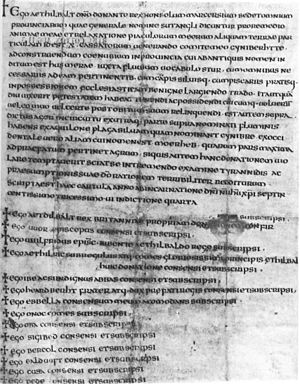Bookland (law) facts for kids
Bookland (which was called bocland in Old English) was a special way of owning land in Anglo-Saxon England. It meant the land was officially given to someone with a written document called a charter. If land was owned without such a document, it was called folkland (folcland).
These two ways of owning land were different because of the old Anglo-Saxon laws. Bookland started around the 600s. It was land that could be freely given away or sold by the owner. This was similar to how we own property today. Folkland, however, was held under older, unwritten customs. It usually had to stay within a family and couldn't be easily sold or given away to outsiders.
There was also something called loanland (lænland). This was land given to someone for a short time, without the owner losing their full rights. It might be given for a few years, for someone's lifetime, or while they held a certain job. Both folkland and bookland could sometimes be used as loanland.
Contents
How Land Ownership Changed in Anglo-Saxon Times
Early Land Laws: Folkland
In early Anglo-Saxon England, folkland was the main way to own land. A person held this land as a representative of their family group. To permanently transfer land outside the family, the king and a council called the witan usually had to agree. Otherwise, land was passed down within the family, often through inheritance.
The exact rules of these old customs are not fully known. Folkland might have included different types of land ownership. For example, some land might have been meant to stay within a family forever. Other land might have been owned by the king to give as rewards. Or it could have been land belonging to the whole community, given out by the king on their behalf.
The Rise of Bookland and Charters
The idea of bookland came into Anglo-Saxon law in the 600s. This happened because of ideas from the Roman Empire's laws. Bookland was land given forever by a written charter. After that, the owner could sell or give it to anyone they wanted. This was the main difference from folkland.
This change in law began when the Anglo-Saxons started becoming Christian in the 600s. The Church and its leaders didn't fit into the old land laws. So, charters were introduced as a way to support them. Land was given permanently to people who built religious places. The owners of this land were usually expected to help maintain roads and bridges and provide soldiers for the army (called the fyrd).
One of the earliest surviving charters was given by King Hlothere of Kent in May 679. It was for a monastery in Reculver, Kent.
Why Bookland Was Desirable
Owning bookland was very appealing to people, not just the Church. At first, church land given by charter was free from taxes. It was also excused from the trimodia necessitas. This was a duty to help maintain bridges and forts, and provide military service.
However, by the late 700s, these special freedoms for church land were removed. This might have been because some people, like the monk Bede, complained. He wrote in 731 that "fake monks" were getting huge amounts of land. They were using it for their own selfish reasons, not for Christian purposes.
As Anglo-Saxon law developed, the religious reasons for bookland became less important. Eventually, they were dropped completely. Bookland then became very much like modern ownership. The owner could give it away during their lifetime, just as they had received it by a "book" (charter). They could also leave it to someone in their will.
How Land Ownership Changed After the Norman Conquest
The End of Anglo-Saxon Land Laws
The way land was owned in England changed a lot after the Norman conquest of England in 1066. The new Norman king, William I, claimed all land for himself. He then gave parts of it to his most important followers. These followers, called tenants-in-chief, held their land in exchange for providing soldiers to the King. This system was called feudalism.
Even though there were big changes, some Anglo-Saxon laws and customs continued after 1066. The Domesday Book, a great survey of England made after the conquest, doesn't use the terms folkland or bookland. But it often describes how land was held just before the conquest. Land held "freely" (libere) is often thought to be like bookland.
Land laws kept changing after the Norman Conquest. The old Anglo-Saxon ways of owning land, like bookland and folkland, did not return. So, the difference between folkland and bookland is mostly important for understanding history. It doesn't have a direct impact on modern English law. However, learning about these old kingdoms helps us understand the history of English law today.
Because very few old records have survived, historians often have to guess about some details. This is why there can be disagreements about how ancient Anglo-Saxon law worked.
See also
- Anglo-Saxon Charters
- Fee simple
- History of English land law
 | Leon Lynch |
 | Milton P. Webster |
 | Ferdinand Smith |


